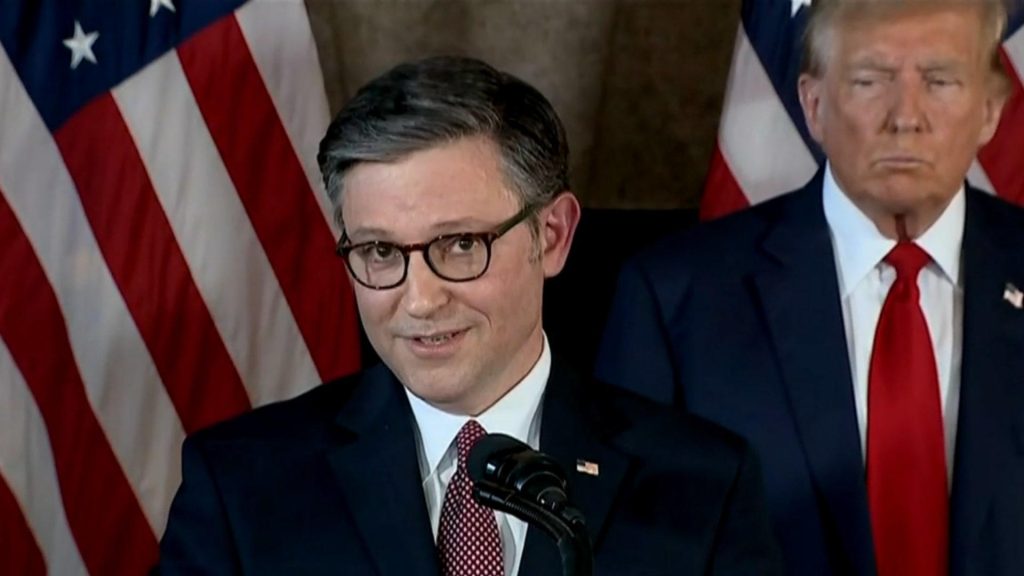
As the race for control of the House of Representatives intensifies, Speaker Mike Johnson is adopting a bold strategy, closely aligning himself with former President Donald Trump. In a bid to nationalize the electoral battle, Johnson is actively campaigning in Democratic-leaning districts while promising an ambitious 100-day agenda aimed at revitalizing the Republican agenda. His approach includes engaging with grassroots supporters through social media and personal interactions, underscoring the importance of Trump’s influence in this critical election cycle.
In recent interviews, Johnson has expressed optimism about achieving a more unified GOP in Washington, suggesting that past internal conflicts that hampered legislative progress will be minimized. However, his reassurances do little to quell Democratic concerns over Trump’s potential unchecked power should Republicans regain control of Congress. Johnson’s comments about accepting election results, particularly if Vice President Kamala Harris wins, have been qualified with caveats, indicating ongoing uncertainties about the electoral process.
Throughout October, Johnson has traveled extensively, raising significant funds and making stops in over 20 states. He is counting on the support of Trump’s base to energize Republican candidates in competitive districts, a notable shift from previous elections where candidates often distanced themselves from the party’s national leadership.
Johnson’s reliance on Trump is evident in his remarks about their working relationship, which he deems essential for the party’s future. As he seeks to maintain the House majority, Johnson recognizes that Trump’s popularity remains crucial, especially in a polarized electorate. “Very often, we are in touch. It’s very important for what we think is going to be ahead of us,” he stated, highlighting the strategic importance of their connection.
The stakes are high for Johnson; if the GOP fails to retain the House, he could face scrutiny about his leadership and strategy. Although he claims he hasn’t contemplated running for House minority leader, the dynamics of a potential loss could force him into a defensive position. Conversely, if Republicans succeed, Johnson would likely continue as speaker, although he would have to navigate a potentially narrow majority.
To avoid the pitfalls that plagued the GOP over the last two years, Johnson insists that a larger majority will provide stability. He predicts that if Trump is back in the White House and Republicans control both chambers of Congress, party members will be more cooperative and less prone to infighting. “I think they’ll want to be part of the reform agenda and not a speed bump,” he said, emphasizing a more cohesive Republican agenda.
The battle for the House largely hinges on 16 Republican-held seats in districts won by Biden in 2020, alongside five Democratic seats in Trump-won areas. Notably, key races in California and New York are receiving immense attention, with significant financial investments aimed at influencing outcomes. Over $110 million has already been spent on ads in New York alone, contributing to an overall record expenditure of $850 million in the House race.
Johnson’s proposed 100-day agenda is designed to appeal to conservative voters, with a focus on deregulation and tax reforms reminiscent of the Trump administration’s policies. He has articulated plans to extend the GOP’s tax cuts, claiming, “We’re going to take a blowtorch to the regulatory state.” This agenda aims to resonate with voters eager for economic recovery and less government interference.
Despite a recent backlash from the GOP regarding his comments on the Affordable Care Act, Johnson has clarified that repealing Obamacare is not part of the current Republican strategy. Instead, he aims to improve healthcare access and quality, stating, “We need greater access. We need lower cost.” This marks a significant shift from previous Republican efforts to dismantle the law, indicating a potential pivot towards a more pragmatic approach to health policy.
However, Johnson’s close ties to Trump have raised alarms among Democrats, especially in light of Trump’s rhetoric about targeting political adversaries. Johnson has attempted to downplay concerns about Trump’s past remarks, asserting that the former president’s goal is accountability rather than retaliation.
As the election nears, Johnson faces the daunting task of balancing party unity, public perception, and the unpredictable influence of Trump. His commitment to a collaborative and reform-oriented agenda will be tested in the coming weeks as the GOP strives to maintain its foothold in the House and counter any narrative of chaos that may arise from its past leadership struggles.






